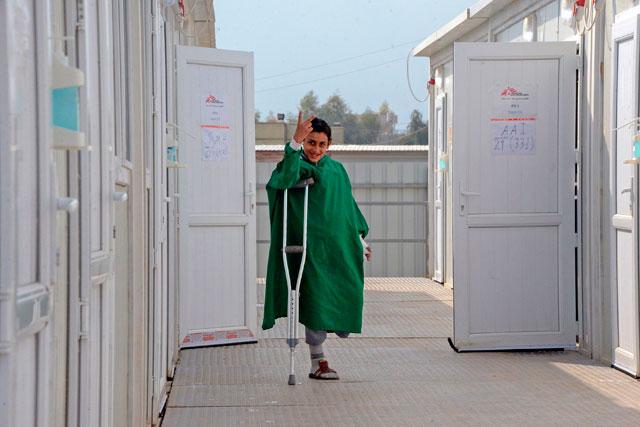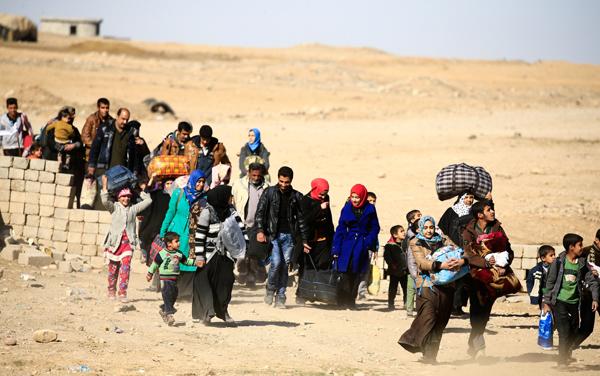You are here
‘Be strong’-Iraqis wounded in Mosul try trauma counselling to cope
By Reuters - Apr 13,2017 - Last updated at Apr 13,2017
SOUTH OF MOSUL, Iraq — Lying in a hospital bed, Iraqi student Ahmed Khalaf is close to despair after having lost a leg when rocket shrapnel hit him as he ran for his life from the Daesh terror group militants in Mosul.
"Be strong, Ahmed, and have no fear," psychotherapist Karam Saad advises the 20-year-old Khalaf as he relates how his family had just set out from home to escape western Mosul's war zone three weeks ago, only for the rocket to crash nearby.
Khalaf is now in a hospital south of Mosul but has lost contact with his father and brother, who were seriously wounded in the March 19 incident. The father and brother are in intensive care in different clinics in Erbil in the relatively peaceful Kurdish autonomous region 80km from Mosul.
They are among 320,000 civilians displaced by the six-month-old battle for Iraq's second largest city, which US-backed government forces are striving to wrest back from Daesh militants who seized it in 2014.
Khalaf is struggling to come to terms with the fact doctors had to amputate his right leg above the knee. He was offered trauma support, something unusual in deeply conservative and religious Iraq, to help him cope with his new disability.
"The psychological sessions have helped me but these thoughts keep coming back about what has happened to me, to my father and brother. They keep coming and coming," Khalaf tells the psychotherapist.
"I can't think of my future right now. But, God willing, I can resume my life, continue my school studies."
The humanitarian group Handicap International has given counselling to Khalaf and more than 5,300 other displaced people from Mosul. It has also provided physical rehabilitation to almost 1,200 badly wounded people including amputees.
But with the battle entering its seventh month and around 400,000 civilians still trapped in the militants' fiercely defended last urban bastion in Iraq — Mosul's labyrinthine Old City, this is just the start.
"Facing a crisis of such scale, the humanitarian organisations may have difficulties in responding to all the needs," said Marlene Sigonney, the group's spokeswoman.
The idea of psychotherapy is relatively new in Iraq, where as in other conservative Arab countries people with emotional problems tend to seek help in a mosque or church, not a clinic.
"In Iraqi society, people are reluctant to deal with psychological issues," said Saad, who graduated from Mosul University before Daesh overran the city. "They accept treatment only for the worst mental cases."
Apart from suffering from trauma, Iraqis who have lost legs or arms in war zones also struggle to get artificial limbs. At a specialist centre run by the International Committee for the Red Cross in Erbil, patients must wait two months for treatment.
The Erbil clinic is trying to recruit more specialists to help cope with an overflow of 210 cases from war-torn Nineveh province, of which Mosul is the regional capital.
One of those learning to walk again is Ahmed Ammar, a car mechanic and father of five who ran a garage in western Mosul.
"I opened the yard door and an IED [improvised explosive device] exploded," he said as he practiced with his new prosthetic leg at the Erbil hospital.
"They cut off my leg from the ankle and fitted a prosthetic leg but then I got gangrene and they cut off my leg further from the knee [down]. Islamic State [Daesh] planted the device. They took my leg."
Related Articles
MOSUL, Iraq — Explosives left behind by the Daesh group in Iraq's Mosul took 12-year-old Abdallah's left leg, but another kind of terror may
KOKJALI, Iraq — Iraqi military medics rushed a man whose mouth had been blown apart by mortar shrapnel into their temporary field clinic on
KHAZIR, Iraq — One wrong word to a Daesh terror group militant in Mosul last year was all it took to set in motion a harrowing chain of even














